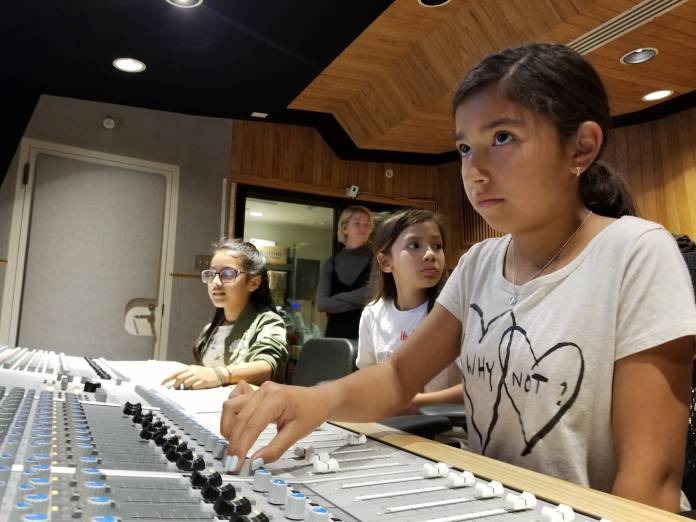ALL EARS For 15 years, the sound engineers at SoMa neighborhood-based Women’s Audio Mission have been applying their skills to one of the field’s trickiest problems: how to get girls involved in STEM. (That’s Science, Technology, Engineering, and Math, for you English majors out there.) WAM, a pitch-perfect acronym, is a professional recording studio, run entirely by women, that doubles as a playground where 1500 girls and women a year learn how to create the media they consume every day. Terri Winston, WAM’s founder and executive director, is an electrical engineer who designed the studio and much of the recording equipment herself. She laughs while revealing the simple hack that all the adults in STEM seem to keep missing: “You guys aren’t even talking to the girls.”
On September 21, WAM celebrates its 15th anniversary with—what else?—a benefit concert at the Brava Theater, which shares WAM’s mission to support women in the arts. Winston asked the luminous duo St. Beauty to headline the event, after she and her students were invited to the soundcheck for Janelle Monae’s Dirty Computer tour and were blown away by St. Beauty’s opening set. The Bay Area’s own Diana Gameros will start the evening with a set of traditional Mexican songs that she recorded at WAM last year. Proceeds from the event will fund WAM’s expansion to a new location in Oakland, where they expect to double the number of girls they reach.
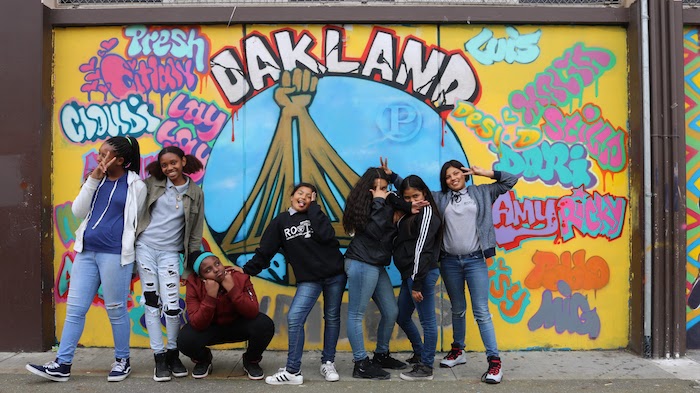
In WAM’s gadget-filled studio, Winston mapped out how she became a sound engineer at a time when training programs like WAM didn’t exist. It takes a special kind of brain to see building a recording studio from scratch as the simplest way to fix intractable gender bias. Fortunately, Winston’s path started in the same sort of technology wonderland that she has created for her students.
48 HILLS You had a pretty unique childhood. Your dad was a research engineer, and you were exposed to his workshop at a young age. Can you paint a picture of what was in there, and what you played with as a kid?
TERRI WINSTON My dad is a mechanical engineer—a metallurgical engineer. He invented something like the largest oven, where they were baking all of these industrial machinery parts. This is pre-personal computer, so computers were huge room-sized things, but I remember playing on the little terminal. I remember his co-workers playing tricks on me so that it looked like I broke it—I got used to being in an environment of all men really early.
48 HILLS What are some of the things you learned about in that environment that you’ve tried to impart to your students?
WINSTON It seems inconsequential, but I learned a lot about hand tools and drills. I think training women to see the freedom of, “Oh, I’ll just build one, and not worry about it” is so important. That’s why they took me so seriously at all my engineering gigs: If something broke, I could fix it. Because women—we all know this—have to go way beyond. I really try to get them [the students] thinking like that.
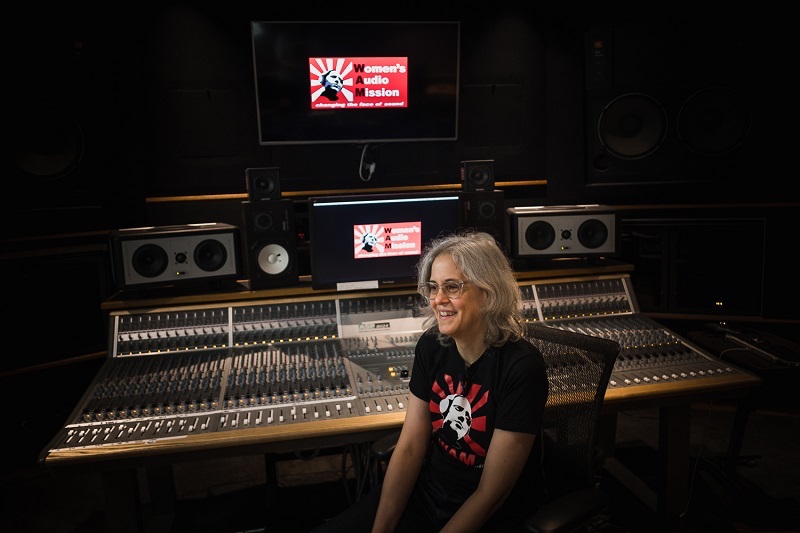
48 HILLS Do you have a sense of how you developed the confidence to build things yourself, or to become an electrical engineer?
Help us save local journalism!
Every tax-deductible donation helps us grow to cover the issues that mean the most to our community. Become a 48 Hills Hero and support the only daily progressive news source in the Bay Area.
WINSTON That definitely came from my dad. I had physics teachers in high school say, “Girls can’t think spatially.” And I would go home and say, “Dad, Mr. So-and-So said….” And he’s like, “That’s bullshit.” And so I would go then, take the test, ace it, and then he’d go, “Yeah, go back to him [the teacher] now with that test.” But what if all the other girls in the class—which there weren’t many—didn’t have a dad that said, “That’s bullshit?”
And then I was in a punk rock band in the ’70s and ’80s. The whole DIY thing in that movement was pretty influential to me too.
48 HILLS What was going on then?
WINSTON That was right off the heels of disco and pop music. There are awesome things that came from [those genres], but living in it felt artificial, and a little too perfect.
Everybody [in the punk scene] stopped trying to do what was traditionally musically happening: people who didn’t know how to play instruments were playing instruments. The house party thing started in punk rock, so that was just scrapping together whatever equipment—like, “Let’s use somebody’s stereo system and wire that up to be the P.A. tonight because we don’t have one.” There was something cool about not being really fussy and precious about the songs, the music, the environment.
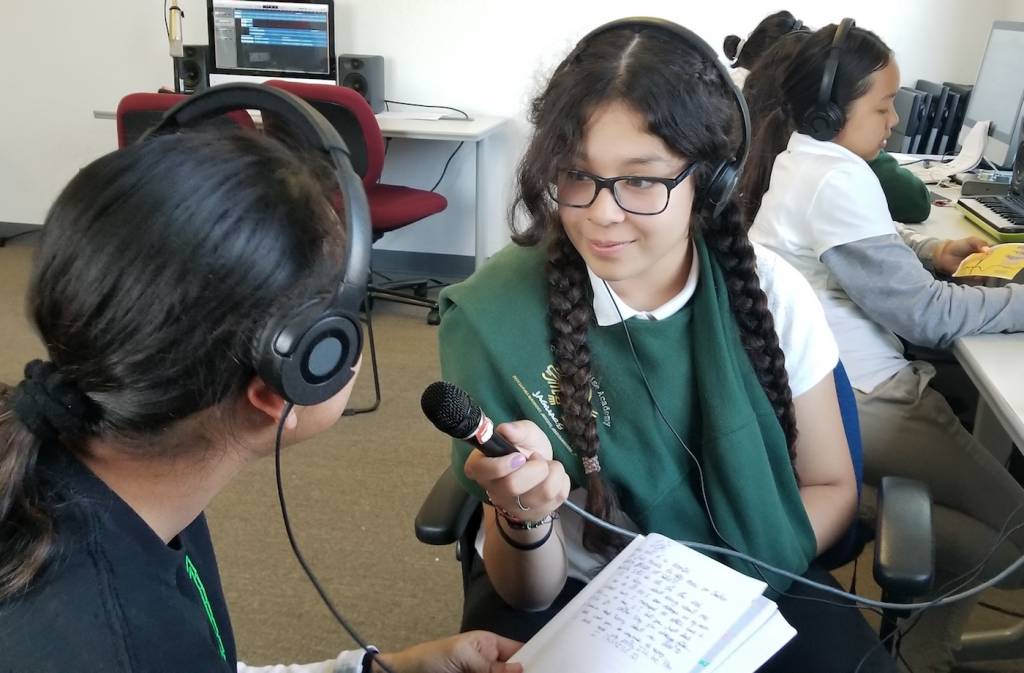
48 HILLS Was it out of that DIY environment that you ended up getting into music production?
WINSTON Yeah, part of it was. During that time, in the early 80s, you had to have a lot of money to make a record. This is when engineers were getting paid properly, so I don’t begrudge any of it, but no one could have self-funded. Everybody was trying to get a record deal, mostly to get in a studio. We had these little tape machines that we were making demos on all the time. I can remember dubbing cassettes to sell at shows, until somebody took notice, and then we did get signed and made records.
I got into production because, when I got into the studio, I quickly realized that’s the place I like to be. I had stage fright, I didn’t love to be on stage. I just was lucky that I worked with some really great producers. Lenny Kaye from Patti Smith Group was really influential. He was the one that said, “Hey, you’ve got this electrical engineering degree. You have the perfect brain for this.”
48 HILLS Had it occurred to you before?
WINSTON No, because you couldn’t get in the studio. Nobody had that kind of access. And when I went to college, none of these schools existed.
That’s why it’s hard to buck this whole production system and the record label system: It was very Wild West, male-dominated, and close-knit. You became this because you knew someone that did it who was your friend. There’s no H.R. department, there’s no external recruiting, there’s no interface to the outside world. To get women involved in that was like pulling teeth. Because they see it as, “Now my friend doesn’t get a job.” They don’t look bigger than that. And it still exists that way. It’s so ingrained.
That’s why we [at WAM] chose to flip it. Like, “Well, if we can’t work in those studios, then we’ll build a studio, and then we’ll have women work here.” I think that’s why it’s been pretty successful: instead of us doing a lot of advocacy, it’s been better for us to just do it. We’re not hurting anybody. And if clients come to us, clients come to us. They can’t argue with it as much.
48 HILLS Why did you want your studio to have an education component?
WINSTON In between record deals, I would teach math for a semester at a community college and make some money. I had guest spoken at City College once, and then the department chair was like, “Hey, I want you to apply for a job here.” She pretty much gave me carte blanche to make the [Sound Recording Arts] degree program what I thought it should be.
I started Women’s Audio Mission as a club there, just to get more women in the program. WAM officially started because the manufacturers that I had known for so long were so supportive. I had all this gear donated. They were like, “You have to build a studio, Terri. If we give this to you, will you build a studio?” I said, “I’ll try.” And these are all men! That’s why I don’t like making generalizations about men in the field. It’s not effective. The good ones get mad, and we want the good ones to really stick with us.
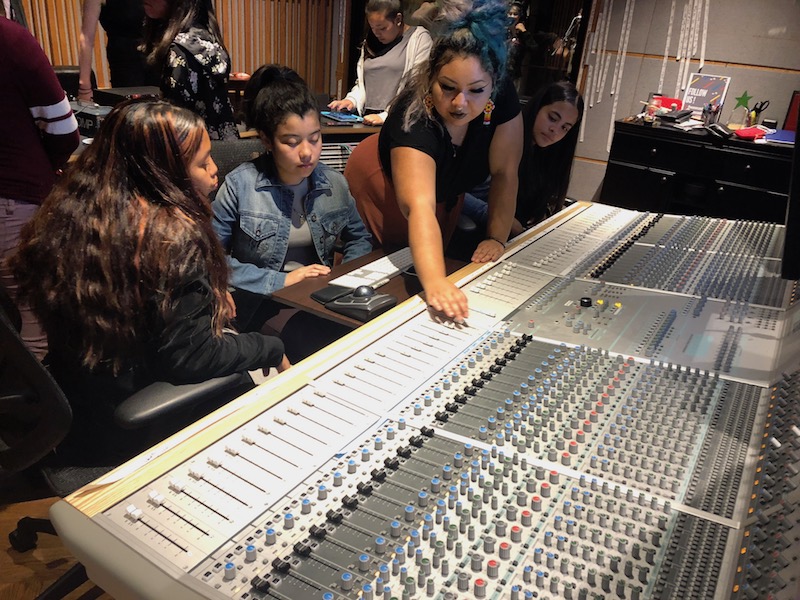
48 HILLS How do the girls you work with respond to being in the studio?
WINSTON We all know that there’s a gender gap in technology, but nobody is really addressing the part of why girls aren’t interested. We’re serving a pretty vulnerable population: 96 percent low-income, 91 percent girls of color. This environment is just a really easy way to get them interested in technology in a way that’s on their terms and becomes useful to them to amplify their voices and express themselves.
The middle school girls’ program’s called “Girls On The Mic,” so a lot of the girls think they have to be on the microphone. You’ve got some that are really drawn to it, but then you’ve got a much larger group, actually, that are like, “Woah, I don’t want to do that part.” It’s really fun for them to realize that they could be a part of this, but not be behind the mic. It could be anywhere. And a lot of the ones that don’t want to sing, end up wanting to sing at the end because they’re like, “I’m in an environment that I’m not usually in. That was really fun to watch my friend do it. Now I’m gonna do it.”
48 HILLS How do you make girls who may not have access to technology at home—or who may never have touched a musical instrument—comfortable in this space?
WINSTON I think an important part of how people go through our program is that all of our instructional staff started as students here. It’s a combination of me being an educator for 20-odd years, and training them in what the learning outcomes need to be, but the mentors are the ones that are going to understand the students and understand how this plugs in for them.
48 HILLS Do you have a story about a particular kid that’s illuminating about the work that you do at WAM?
WINSTON Oh god, there’s so many. Somebody lost their father, wrote a song about it, and played it front of their school. I think that’s a testament to how safe they felt in that class, where they could do this incredibly difficult thing. We were like, “This is so sad.” But the teachers said, “You know, that process helped her, because she’s a lot better in school now.”
48 HILLS I interviewed Diana Gameros about her album Arrullo, which was recorded at WAM. She talked about the way working in an all-female environment that understood her aesthetic opened her up musically and made the recording better. It made me wonder how much good music we’re missing out on because female artists don’t feel comfortable in the studio.
WINSTON A lot. What really made me think about it was we had so many men recording here. And then we realize there’s a huge chunk of men that don’t want to record in that kind of aggressive environment, where they feel like they can’t do the right thing. Anybody that’s going to be uncomfortable in a very traditional male environment comes here.
All that aggressive, blustery behavior—that’s because they’re afraid. So we’re really careful that we’re not pushing that fear onto the artist. Also this idea that what we’re doing is rocket science: “This is the hardest job in the world, and only I can do it.” That’s not helpful to the artist. Instead, try educating them and having them feel a part of it.
48 HILLS What are your goals for the benefit concert and the next year of WAM?
WINSTON The 15-year anniversary is definitely looking towards Oakland. We opened a location in Oakland, and that location is actually going to serve more girls than this one over here [in San Francisco]. We have to start fundraising to look towards purchasing something there, and then we’re also looking at other parts of the country as well. So, Oakland this year, and others to follow!
WAM’S 15 YEAR ANNIVERSARY CELEBRATION
Featuring St. Beauty, Diana Gameros, and Chulita Vinyl Club
Fri/21, 6-10pm, $75 (includes light food and beverages)
Brava Theater, SF.
Tickets and more info here.

